
In the context of the SmartEcoMountains project, which aims to create a Thematic Centre to expand the knowledge on the functioning of Sierra Nevada ecosystems in global change scenarios, LifeWatch ERIC held a meeting with LALINET (Latin American Lidar NETwork) and ACTRIS (Aerosols, Clouds, and Trace gases Research Infrastructure Network) to foster collaboration in the future. The meeting took place in Granada from October 17 to 20, to exchange and transfer knowledge to identify future collaborative opportunities among these three entities.
Researchers from various Latin American countries, including Colombia, Chile, Bolivia, Argentina, and Brazil, attended the meeting to collaborate and design joint actions to understand better Earth-Atmosphere interactions using lidar techniques.
On the first day of the meeting, each network showcased its infrastructures, capabilities, needs, and interests for future collaborations. A major topic of discussion was vertical signal data processing. ACTRIS-ERIC presented their Centre for Aerosol Remote Sensing (CARS) and other tools that sparked interest in exploring future implementations for lidar data processing. Two distinct processing tools for atmospheric profiling were introduced, such as the Lidar Processing Pipeline (LPP), an open-source lidar signal analysis software developed in Latin America.
The participants also engaged in a lively discussion on including Artificial Intelligence within the vertical profiling data processing framework, recognising its potential to enhance these processes. LifeWatch-ERIC offered valuable resources to enrich the collaboration, including blockchain for data traceability to ensure transparency and security and to develop cutting-edge virtual research environments (VREs) to support research and management of the infrastructures.
The meeting explored possibilities for applying to joint proposals on European calls, such as Marie Sklodowska-Curie Actions: Research and Innovation Staff Exchange (RISE) and other possible international cooperation programmes.